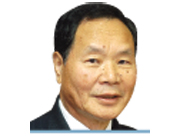Park’s foreign policy
President-elect Park Geun-hye has appointed former Defense Minister Kim Jang-su as foreign policy point man for her transition team that will prepare for next month’s inauguration of the new administration. Although foreign policy, including the North Korea issue, was not a dominant campaign issue, it is directly linked to most important national interests for survival, security and domestic tranquility.
Kim was noted for standing tall without bowing to late North Korean leader Kim Jong-il during an arrival ceremony for former President Roh Moo-hyun’s visit to Pyongyang in October 2007. Subsequently, Kim was picked up by the then Grand National Party as a member of the National Assembly. Kim also worked on Park’s election campaign.
In addition to Kim, two other experts were appointed to serve the transition subcommittee on “diplomacy, national security and unification.” Yoon Byung-sae, a former presidential secretary for national security and foreign affairs, and Choi Dae-seok, a professor of North Korean studies, were chosen to join the foreign policy team.
During her campaign, Park Geun-hye made it clear that she would take a less rigid approach to the North than President Lee Myung-bak. She said she would delink humanitarian assistance from the intractable denuclearization issue.
Park said she would honor the two summit declarations of 2000 and 2007, and would pursue a “trust process” toward economic cooperation and denuclearization based on multilateral cooperation and re-enforced deterrents. She is yet to elaborate on how the “trust process” would or should begin.
Park also said that she would meet with North Korean leader Kim Jong-un if it would help resolve the nuclear and other intractable issues affecting the security of the South. A public consensus in the South supports the resumption of inter-Korean dialogue as a restarting point toward security and peace on the peninsula.
Critics are skeptical any bold move would be made on the part of the new South Korean administration toward improved inter-Korean relations, as long as the South sticks to the Lee administration’s position of demanding a North Korean apology for the sinking of the naval ship Cheonan and keeping the May 24 restrictions in effect against economic cooperation.
Any South Korean move, of course, depends on what the North does. In a New Year’s verbal message, which departed from his father’s style and returned to his grandfather’s, Kim Jong-un called for ending “the situation of confrontation” between the North and the South and for implementing “the North-South joint declarations” of 2000 and 2007.
Kim Jong-un also stressed the North’s need for economic recovery. His message included familiar cliches such as military advancement, exclusion of foreign interference, and national unification. However, it did not contain vituperative criticisms of the South that were characteristic of North Korean statements against the Lee administration.
While silent on Washington, Kim’s New Year’s statement appeared to signal that the North is ready to talk to the new government in Seoul and Barack Obama’s second administration, if an opportunity arises. Pyongyang will closely watch Seoul in particular, as it is viewed that the second Obama administration will be responsive to Park Geun-hye’s policy on the North.
Challenges to Park’s foreign policy coincide with the transition of power to newly elected, re-elected or newly installed leaders in Seoul, Tokyo, Moscow, Washington, Pyongyang and Beijing. A common challenge to all these countries is to maintain stability in Korea and the region, while focusing on economic issues to improve the wellbeing of their people.
In the shifting dynamics of influence in the region, with hegemony competitions between China, the U.S. and Japan, and thorny territorial issues from Dokdo to the South China Sea, and the vicissitudes of a nuclear North Korea, every policy wonk I know says South Korea should keep a robust alliance with the United States, while improving the “strategic partnership” with China, at least for the next five years.
An outlook for Japan’s return to militarism, however slim, casts a nightmare for China and the two Koreas, although it might serve as a counterbalance against China’s dominance of the region. In any case, Japan will strengthen its alliance with the U.S. as a necessary security policy. North Korea at present is a clear strategic asset to China, and South Korea to the U.S.
Whether Seoul can improve its strategic relationship with Beijing invariably depends on U.S.-China relations. If the two giants cooperate more than compete with each other, it would be easier for Seoul to maintain its alliance with Washington and improve relations with Beijing. Otherwise, Seoul may face some hard choices in the years to come.
Park’s most crucial challenge begins with the question of how to deal with the North. Waiting for the North to change has been proven futile. By taking a new, positive initiative, Park’s administration would be able to lead the other powers ― including the U.S. and China ― toward the resolution of the issues of security and peace, without which no economic growth is possible. What’s your take? <The Korea Times/Tong Kim>

























































